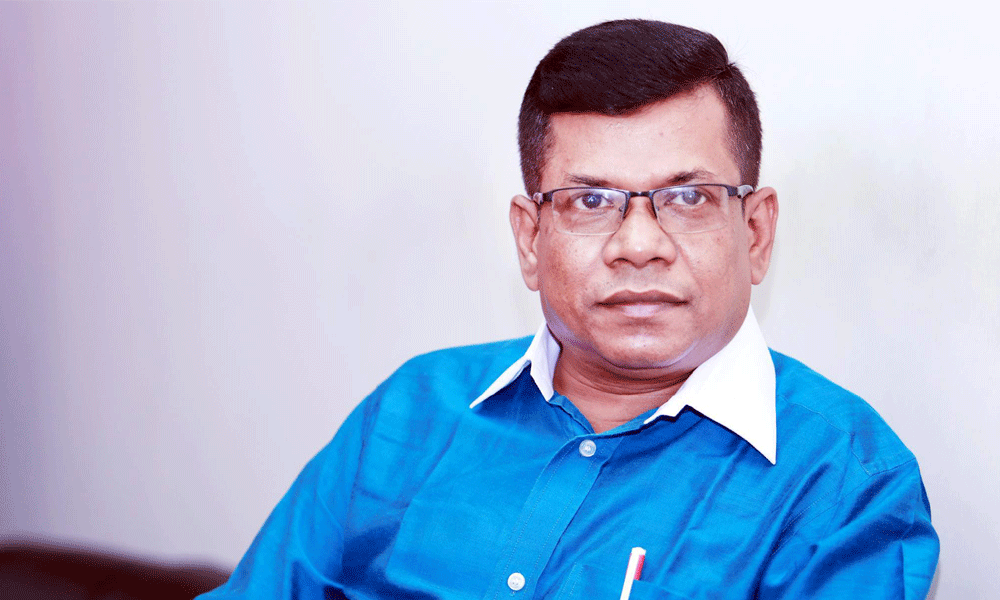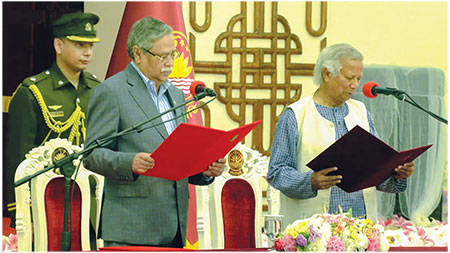Five-year Hype: Is Dr Yunus Being Elevated or Undermined?
Mostofa Kamal
Published: 20 Apr 2025

Even though no clear roadmap has emerged yet, the election seems visible—like the proverbial distant palm tree. It’s quite apparent that the country has boarded the election train. Once the whistle blows, it might depart aiming for December or June—or even slightly before or after. Amid this pre-election atmosphere, a new hype has surfaced: keeping Dr Yunus in power for five more years. But is this meant to honor him—or to dismantle his reputation?
When Dr Yunus first spoke about the election timeline, he hinted at December. The army chief’s mention of elections within 18 months could stretch to March at best. But the Chief Adviser’s press wing appeared to lean towards June. At one point, the Chief Adviser himself said if minimum reforms are done, elections could be held in December; if maximum, then June. These varying statements outline a timeline ranging from December to June. Even if it's delayed by a month or two, most political groups likely won’t object. But now, this emerging hype around keeping Dr Yunus in power for five more years has raised serious questions. Who is pushing this narrative—and with what intent?
So far, Chief Adviser Dr Yunus has not personally expressed any desire to remain in power for five more years—neither directly nor indirectly. On the contrary, he has repeatedly said he looks forward to returning to his former profession and colleagues. Yet, some of his advisers and a few leaders of the newly formed National Consensus Platform (NCP), which helped bring him to power, have been stirring the waters.
One adviser claimed that the people want them to remain in power for five more years. Later, trying to clarify, he said these words weren’t his—they were said by people on the street. That softened the matter somewhat, making it sound more like casual talk. But another adviser stirred more controversy by declaring, “We are elected too.” Naturally, that prompts the question—when was the election held, and who voted? Such statements are reminiscent of the absurd rhetoric of politicians like Hasan Mahmud or Obaidul Quader.

Of course, some may genuinely want to see Dr Yunus in power for an extended period. That’s not the issue. What’s concerning is the growing tendency to attack anyone who suggests that Dr Yunus should seek a public mandate. If someone doesn’t align with their views, they're labeled and attacked. There are even people arguing that since Sheikh Hasina ruled unlawfully for 15-16 years, Dr Yunus should now be allowed to govern for the same period to restore level playing field.
Even if Dr Yunus is no longer just the Chief Adviser of Bangladesh, he remains a globally respected figure—branding Bangladesh positively from a key national position. Apart from the Awami League and its loyalists, hardly anyone stands against him. Nationalist forces, patriotic right and left, and young students—everyone appears to support him. Some are inspired, others awestruck. Dr Yunus and several members of his council have captivated people with their competence, skills, and almost magical touch. Dr Yunus, in particular, is seen as a universally admired figure—he belongs not only to Bangladesh but to the entire world.
So if he—or someone close to him—wishes to see him in power for five years, ten years, or even a lifetime, that’s not inherently wrong. But they must seek the people’s mandate. That would bring him genuine honor. And the opportunity is there: they can prepare for the elections, form a party, step down before polls, and contest for public office. If people truly want them, they will win freely and fairly, with honor and dignity. They will govern with legitimacy. No one could accuse them of being unelected. Even the opposition would struggle to protest—because the people would be solidly behind Yunus and his party.
But instead of taking this straightforward path, why is there a push to keep them in power without votes for another five years? Is this truly a noble idea—or a scheme to sink Dr Yunus? Otherwise, why this undemocratic obsession with extending his tenure without elections? And why float ridiculous campaigns like "March for Dr Yunus"?
The government, and the Chief Adviser himself, must clarify their stance now. There’s growing suspicion. Even NCP, the youth platform that brought forward demands for reform before elections, has distanced itself from such efforts to extend Yunus’ rule without voting. Consciously or not, those lifting Yunus onto a pedestal in this manner are rehearsing to turn him into an unpopular and controversial figure. Their actions risk erasing his achievements and tarnishing his legacy. This farce must end immediately.
If anyone inside or outside the government is fueling or connected to this scheme, it must be stopped now. Time is ticking. The Election Commission says it is preparing with a December timeline. Even if it extends to June, there's not much time left. If the goal is just to hold an election for formality’s sake, that’s another story—there are always experts ready to rig votes overnight or fabricate full results in all 300 seats. But is that what people want? If so, why did they risk their lives on August 5? Why did Abu Saeed, Mughda, and Wasim give their lives?
This generation hasn’t seen what real voting looks like. But over the past five years, they’ve heard tales of elections, and all they’ve seen are circus-like spectacles. Cleaning this stain requires serious work from the Election Commission.
Key preparations include: compiling a transparent voter list with photos, redrawing parliamentary boundaries, setting up polling centers, procuring election materials, appointing and training polling officers, registering new political parties and domestic observer groups. Many of these tasks must be completed before the election schedule is even announced.
This time, however, the context is very different. Creating a fair electoral environment is not solely the EC’s responsibility—the government and political parties must also step up. But their current inaction and time-wasting attitude send a troubling signal. No country that goes 17 years without a real election—or where elections are mocked—retains any democratic credibility. Bangladesh has already lost its diplomatic value, and economic relevance has also diminished due to persistent political instability.
That’s why even at the recently held investment summit, some participants raised questions about political stability in the country. Their message was clear: without an elected and stable government, investors—local or foreign—won’t have confidence. Their number one demand is a credible, elected government. And that’s only possible if we quickly build a roadmap for a widely accepted election.
_____________________________________
The writer is a columnist and Deputy Head of News, Banglavision

